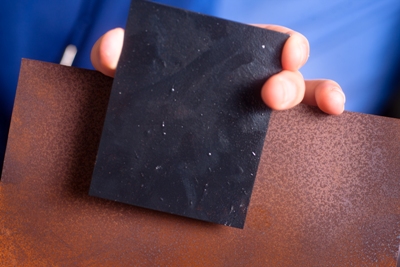A research team led by Professor Sarbajit Banerjee and PhD student Robert Dennis from the University at Buffalo has achieved a key development on rust-proofing steel with the use of a graphene-based composite, which is under development at the university.
 A graphene-based coating under development at UB keeps a piece of steel rust-free (foreground), in stark comparison with a rusted sheet of steel (background).
A graphene-based coating under development at UB keeps a piece of steel rust-free (foreground), in stark comparison with a rusted sheet of steel (background).
In the research team’s initial experiments, advanced varnish-coated steel pieces did not get rusted only for a few days when submerged continuously in brine. However, the researchers were able to keep steel in brine rust-free to nearly one month when they treated the material by varying the composition and dispersion of graphene in the composite.
This novel graphene-based composite can serve as an eco-friendly substitute for hexavalent chromium coatings. Hexavalent chromium is a potential carcinogen. The researchers’ next step is to improve the lasting power and finishing quality of the graphene composite using a $50,000 grant awarded by the New York State Pollution Prevention Institute.
The researchers have been assisted by Tata Steel, which provided financial support for Banerjee's projects, for testing larger sample sizes. According to the researchers, commercialization of this graphene-based coating will be beneficial to public health and will save jobs.
Banerjee explained that graphene’s conductive and hydrophobic properties are helpful in preventing corrosion by repelling water and inhibiting electro-chemical reactions, which causes rust by converting iron into iron oxide. The graphene-based composite can be fine-tuned for use in factories specializing in chrome electroplating, thus offering an opportunity to factories to meet stringent environmental regulations pertaining to chromium pollution.
The Office of Science, Technology Transfer and Economic Outreach of the University at Buffalo has filed a patent application to protect the rights for this graphene-based coating technology. Tata Steel also has some rights to this coating technology.
Source: http://www.buffalo.edu